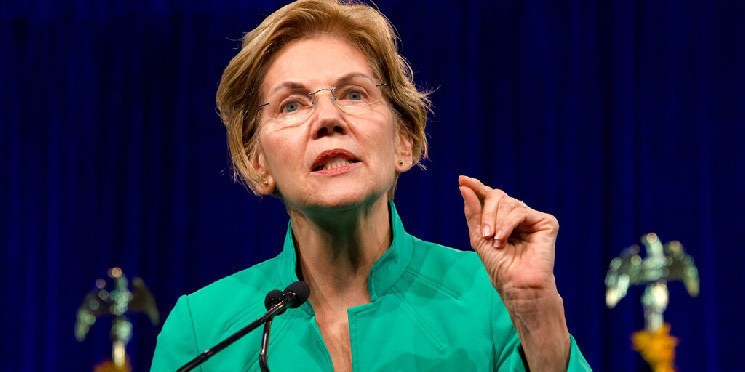Sen. Elizabeth Warren (D-MA) and leading consumer advocacy groups denounced a report Friday that Amazon and Walmart are considering issuing their own stablecoins, framing such developments as an unacceptable outcome of pending stablecoin legislation in the Senate.
“Let’s not forget the GENIUS Act has a major loophole allowing Big Tech companies and major retailers to issue their own private currencies structured as stablecoins,” Warren said Friday in a statement shared with Decrypt. “If Congress doesn’t fix it, billionaires like Elon Musk, Jeff Bezos, and Mark Zuckerberg could launch stablecoins that track your purchases, exploit your data, and squeeze out competitors.”
“Then they’ll come begging for a bailout when it inevitably blows up,” Warren continued. “The GENIUS Act shouldn’t pass without preventing these risks.”
Amazon and other major merchants including Walmart and Expedia are mulling issuing their own stablecoins should the GENIUS Act imminently pass, a Wall Street Journal report revealed Friday. A spokesperson for Warren told Decrypt the senator, who is the Ranking Member on the Senate Banking Committee, denounces such plans.
Amazon, Walmart, and Expedia did not immediately respond to Decrypt’s requests for comment on this story.
The GENIUS Act, which could pass a final vote in the Senate as soon as next week, would for the first time create a legal framework for issuing stablecoins in the United States.
Stablecoins are crypto tokens generally pegged to the U.S. dollar that allow holders to enter and exit crypto positions without accessing dollars directly. They are, for that reason, a key connector between crypto and traditional financial markets.
Should the bill become law, numerous sectors have expressed interest in adopting or issuing stablecoins, including Big Tech firms and merchants. The motivations for doing so are diverse: tech companies could use stablecoins to gather key financial data about their customers’ spending habits, and merchants could use them to dodge traditional payment processors that charge them billions of dollars in fees every year.
Further, any issuer of a stablecoin could earn passive yield on their customers’ deposits, creating an incentive for most traditional finance players to enter the sector. Wall Street financial market infrastructure giant DTCC, for example—which processes U.S. stock trades—is currently exploring “the potential of issuing a DTCC stablecoin” for use in financial transactions, a company representative confirmed to Decrypt. The company’s stablecoin plans were first reported by The Information.
Last month, the GENIUS Act’s odds of passage were nearly derailed by Democratic opposition, which focused, among other subjects, on the bill’s potential to allow America’s largest tech corporations to create their own private currencies. Democrats did succeed in adding new language to the bill on the subject, but the legislation would still allow giant tech companies to issue stablecoins—and collect customers’ financial data from them—under easily met conditions.
“Alllowing the tech industry to issue private money will amplify financial stability risks,” Corey Frayer, director of investor protection at the Consumer Federation of America, told Decrypt. “The danger of a small set of corporations having immense power over consumers and the broader economy is why we separated banking from commercial ventures in the first place.”
“How can any independent business compete when the big guys are running unregulated bank side-hustles?” Amanda Fischer, policy director at consumer advocacy nonprofit Better Markets, wrote Friday on X.
3. Amazon/Walmart have outsized influence on vendors. Imagine you’re an independent seller, & now your revenue MUST be accepted in Amazon dollars. Maybe you have to pay an exchange fee to convert to $ or maybe Amazon punishes you on search results if you don’t maintain a balance
— Amanda Fischer (@amandalfischer) June 13, 2025
The GENIUS Act is currently in its final stretch of procedural hurdles, and is widely expected to pass early next week, given key Democrats have come back aboard the legislation. It would then need to pass the House before heading to President Donald Trump’s desk for signature.
“The growing interest of major traditional companies in stablecoins signals that stablecoins—and blockchain-based financial infrastructure more broadly—are gaining serious traction beyond the crypto-native ecosystem,” Blockchain Association Policy and Legislative Analysis Manager Salah Ghazzal told Decrypt. “This marks a broader shift in how industries view the potential of digital assets, not just as speculative tools but as foundational infrastructure. Momentum like this adds urgency to getting stablecoin legislation passed.”
Though Republicans have eagerly pushed to get the bill passed, Sen. Josh Hawley (R-MO) recently came out against it, in a rare intraparty rebuke of the high-priority legislation.
“It’s a huge giveaway to Big Tech,” Hawley told the New York Times last week. “It allows these tech companies to issue stablecoins without any kind of controls. I don’t see why we would do that.”
Edited by Andrew Hayward
Read the full article here









